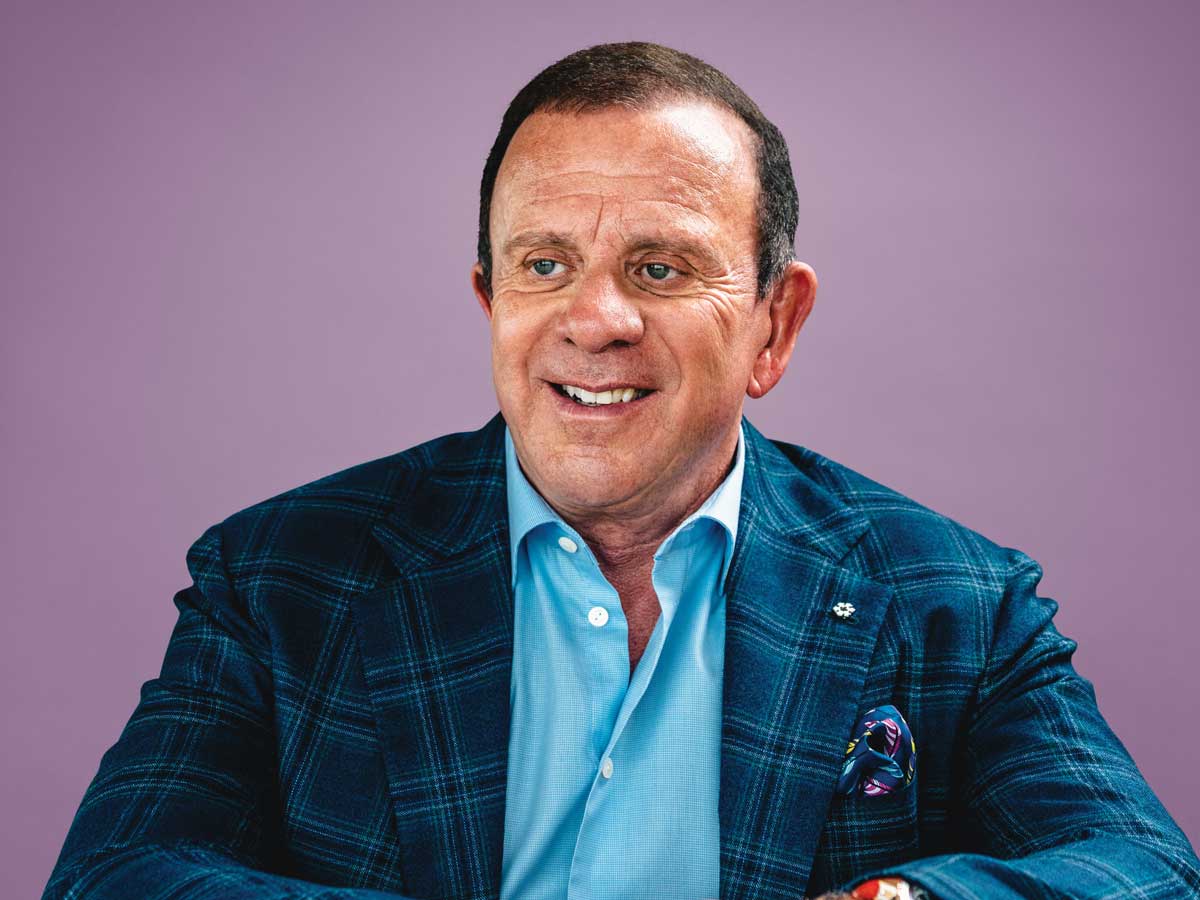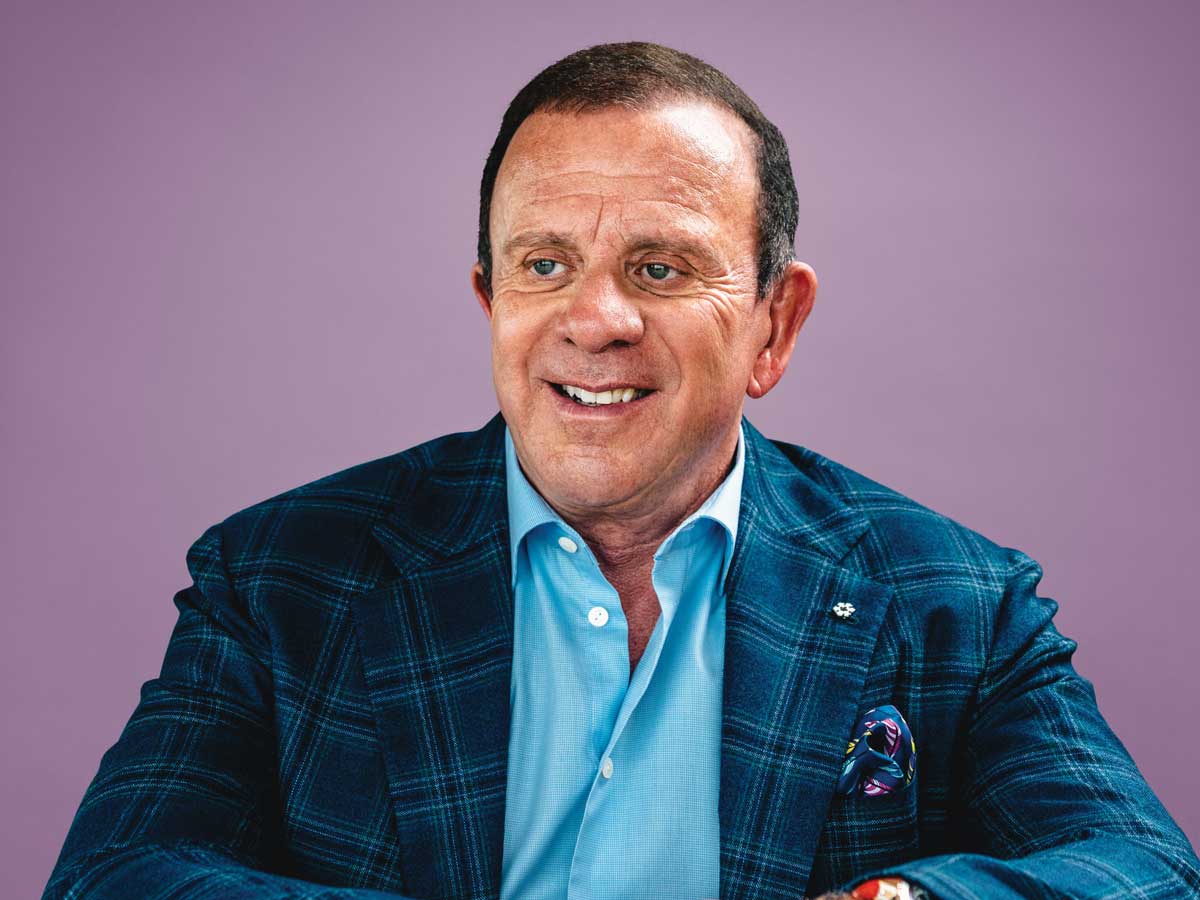
What’s next for Peter Gilgan?
 Peter Gilgan has an estimated net worth of US$4 billion, according to Forbes (Photograph by Jake Sherman)
Peter Gilgan has an estimated net worth of US$4 billion, according to Forbes (Photograph by Jake Sherman)
On a clear February day, Peter Gilgan’s luxury penthouse on the 55th floor of the Four Seasons in Toronto’s chic Yorkville neighbourhood provides a fitting perch to take in the urban and suburban landscape that he’s done so much to shape. In 1978, the former accountant’s firm, Mattamy Homes, built its first two homes in Burlington, Ont. Today, the company is the largest private homebuilder in North America, having constructed more than 100,000 homes across Ontario, Alberta and several U.S. states.
Along the way, Gilgan—who has an estimated net worth of US$4 billion, according to Forbes—has emerged as one of Canada’s most generous philanthropists. In June 2019, he donated $100 million to Toronto’s Hospital for Sick Children, which will go toward building a new patient care tower—one of many such gifts he’s made. Last year also brought another milestone for the father of eight: Gilgan, 69, reorganized Mattamy (named after the oldest of his eight children, Matt and Amy) to create a new parent company, Mattamy Asset Management (MAM), of which he will be chairman and CEO. MAM will hold the Canadian and American homebuilding businesses as standalone companies, as well as invest in a wide range of asset classes, private equity and new ventures. Gilgan spoke with Pivot about the state of Canada’s housing market, MAM’s early investments and the meditative joy of long-distance cycling.
PIVOT: Before you started building homes, you were a professional accountant. How did that prepare you for what was to come?
Peter Gilgan (PG): I was very fortunate to work with small- to medium-sized clients. I was sort of a confidant to a number of them. I got to learn from other people’s mistakes and successes. I got to see different management styles, ranging from management by bumbling, to management by fear, to management by inspiration. I had a million-dollar education that did not cost me a dime.
PIVOT: What is your management style?
(PG): Management by inspiration. We talk convincingly and with deep conviction about what a valid and just thing it is we’re doing, and hopefully people are inspired by that and carry the ball down the field.
PIVOT: You need a team you can trust to do that. What’s been your approach to finding the right people?
(PG): In our Toronto-based business, I’ll bet the average employee’s tenure is north of 20 years. My commitment is: I’m not giving people jobs, I’m giving them careers. The big difference, especially in this industry, is when the economy turns, as it inevitably does, we do not turn. We keep going. So, most years, our employees work for the company, but some years the company works for them. That’s something you have to plan for.
 Over the years, Gilgan has given more than $260 million to various causes (Photograph by Jake Sherman)
Over the years, Gilgan has given more than $260 million to various causes (Photograph by Jake Sherman)
PIVOT: In Toronto, average home prices are now climbing again at double-digit rates. Is that sustainable?
(PG): A moderate level of inflation in real estate prices is very good and very healthy. It’s been a huge contributing factor to building this country over the last century, to inspiring people to own their own homes and working that little bit harder to achieve that. I’d like to see it remain like that.
PIVOT: What changes have you seen in how Canadians view home ownership?
(PG): I don’t see a significant diminution in people’s desire to own, but I do see diminution in the ability to afford to own. I also think what owning a home looks like for a significant portion of young people today is different than prior generations, in terms of an urban lifestyle. It used to just be a way to get into the market and not a first choice.
PIVOT: Is there an affordability crisis in certain Canadian housing markets?
(PG): There’s an availability crisis that leads to an affordability crisis. There are two issues. The amount of time it takes to get anything approved is two to three or more times as long as it was 30 years ago. That’s exacerbated by the dearth of land inside approved areas of development, which has led to a stunning shortage of land that can be brought on stream in our lifetime. And so house prices have outpaced wages. We’ve been living in a period of phenomenally low interest rates, so in terms of monthly payments, it hasn’t been as onerous. But if we were in an eight or 10 per cent mortgage environment, things would look very different.
PIVOT: What led you to decide to launch Mattamy Asset Management?
(PG): They say don’t put all your eggs in one basket. I’ve been doing homebuilding all my life, but when you look to the future, the prudent thing to do is to have some diversification. And I want to make it clear that we’re not shrinking our homebuilding business. People keep interpreting it that way.
PIVOT: What has MAM invested in? You’ve been quite tight-lipped so far.
(PG): It’s really early days. We have a wonderful committee of folks who run the more passive investment side of things. A small percentage has been allocated to blue-chip type stuff. Some of it’s in very entrepreneurial ventures, which, given my background, is where I’m more involved. Some is investing in startups, including companies we’re starting.
“I want to bring to the table something besides just a cheque. It’s important to have the follow-up.”
PIVOT: Over the years, you’ve given more than $260 million to various causes, many in the healthcare sector. You’ve said you don’t want your philanthropy to be about just putting your name on things—that you wanted to find something more grassroots. Have you?
(PG): Yes, we have. We’re working with the WE organization to build a college in Kenya. It’s under construction right now. We’re financing two of its eight faculties—civil engineering, as well as business and IT—and one of my ambitions is to get some of my friends and colleagues, very successful businesspeople and wonderful engineers, to become guest lecturers at the college. I love the idea of being able to bring to the table something besides just a cheque. You’ve got to have the cheque, but you’ve got to have the follow-up.
PIVOT: Would you ever consider doing what Bill Gates and Warren Buffett have done and pledge to give away the bulk of your fortune to philanthropy?
(PG): It’s great for them. I’m not in that league. My net worth would be a rounding error for those two guys. But I like the legacy game and hopefully it’s wealth that lasts and grows for many generations and is used for good things: to increase the amount of philanthropy we do, but also to create lots of employment in this country. You can’t create employment without capital.
PIVOT: Prior to the Ontario election, you and other large developers gave money to the controversial group Ontario Proud, which was dedicated to defeating Kathleen Wynne’s Liberals. What were your intentions?
(PG): I am deeply concerned about housing. Of course, that’s how we make money, but I believe it’s also a really noble profession that contributes to the health and well-being of society. The real focus to me was about availability and affordability, and we felt this group could be a voice for that. Obviously, you can’t control what others are going to do and say, and we didn’t share their views on other issues. The reaction of our stakeholders made us rethink that, and while I’ll never stop talking about the issue, we made a decision that this type of contribution was one and done.
PIVOT: You’re an avid cyclist. You’ve ridden across Canada for charity. What’s your favourite thing about being on your bike?
(PG): Oh, where do we start? There’s the cardio and muscular fitness. The camaraderie that comes with riding with good friends. There’s also no better way to see the land. Sometimes it just clears the mind. I’ve had some phenomenally meditative moments when I’m riding on some old country road somewhere in Italy or God knows where, and I’ll just get lost in myself for an hour and come out of it with crystal clear insights.
HOUSING IN CANADA
Learn the real story behind housing and household debt in Canada in a report by Francis Fong, CPA Canada’s chief economist. Also, be aware of these real-estate scams, which fraudsters use to exploit vulnerable Canadians.